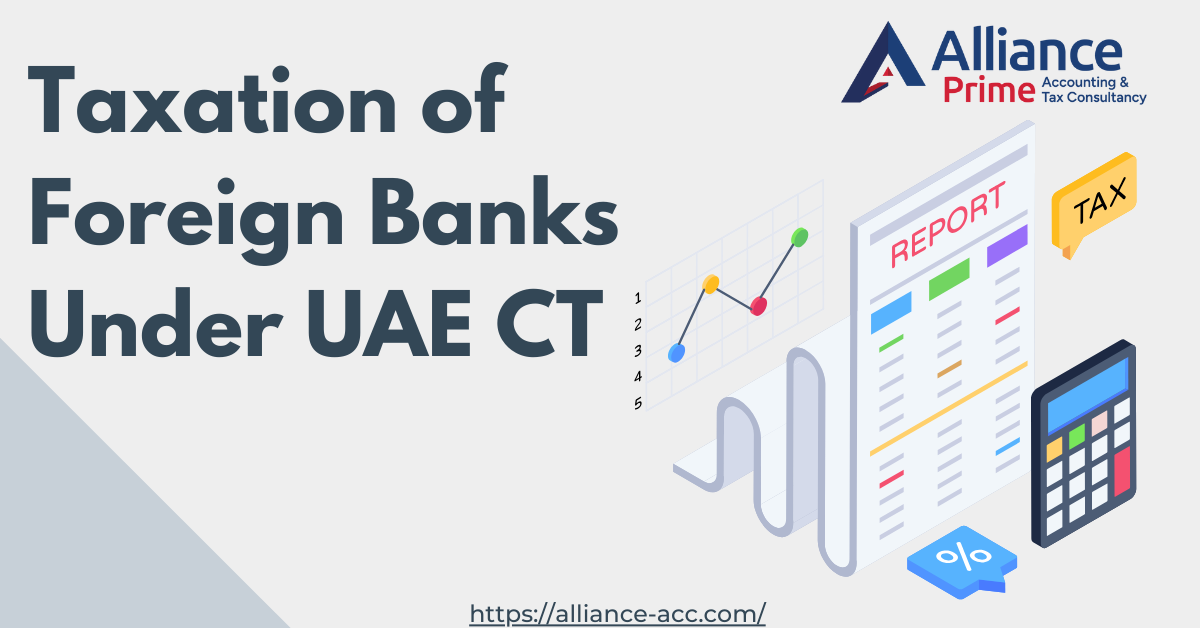Foreign banks in UAE were taxed differently until March 2024. Dubai’s ruler, Sheikh Mohammed Bin Rashid Al Maktoum, published Emirate Law No. 1 of 2024. The new law taxes foreign banks in Dubai and includes numerous major reforms that foreign banks must understand and comply with.
This blog explains the new Emirate Law No. 1 of 2024 and its effects on foreign banks. We’ll explain the law’s main points, how it impacts tax computation and payment, and compliance requirements. At the end of this article, you will understand the new taxation laws and be more able to handle them.
Importance of Understanding the New Taxation Rules
Knowing the new taxation laws/rules is important for several reasons:
- Accurate Tax Calculations: The new law provides instructions for computing taxable income. Understanding these requirements helps foreign banks compute and pay taxes accurately.
- Planning and Strategy: Understanding new taxation laws helps foreign banks develop efficient financial plans. This includes taking advantage of tax incentives and meeting tax obligations on schedule.
- Regulatory Compliance: Adherence to the new rule is crucial for preserving good standing with Dubai’s regulatory bodies. Foreign banks in the area need this to survive.
Background and Overview
Overview of the Old Law (Regulation No. 2 of 1996)
Foreign banks operating in Dubai were taxed under Regulation No. 2 of 1996. This rule required Dubai foreign bank branches to pay a 20% Emirate-level tax on their taxable revenue. The bank branch’s accounting rules were used to compute taxable income, with modifications made according to the regulation.
Foreign banks must file strictly under this rule. They had to produce a tax declaration each fiscal year, approved by external auditors. This disclosure must include the branch’s audited financial statements and taxable income calculation. This made the bank’s tax obligations open and verifiable by the Dubai Department of Finance.
Introduction of Federal Decree-Law No. 47 of 2022 (Federal CT Law)
The Federal Corporate Tax (CT) Law, Federal Decree-Law No. 47, changed things in 2022. This law significantly altered the UAE taxation structure for enterprises, including UAE-headquartered banks and foreign bank branches.
Under the Federal CT Law, these banks paid 9% corporate tax on their taxable revenue. Banks that paid the 20% Emirate-level tax under the former rule now had to pay 9% federal tax. This meant foreign banks operating in Dubai might be taxed twice—the Emirate-level tax and the federal corporate tax.
The FAQs accompanying the Federal CT Law said that Emirate-level taxes paid could not be used to reduce federal corporate taxes. Due to double taxation, foreign banks could not lower their federal tax liability by the Emirate tax they had previously paid.
The new Emirate Law No. 1 of 2024 addresses these concerns and streamlines tax duties for foreign banks operating in Dubai by introducing a more integrated taxing structure. Allowing the deduction of federal business tax paid from Emirate-level tax reduces double taxation, which is critically required.

The New Emirate Law No. 1 of 2024
Applicability and Scope
His Highness Sheikh Mohammed Bin Rashid Al Maktoum’s Emirate Law No. 1 of 2024 took effect on March 8, 2024. Foreign banks in Dubai need this law since it introduces new taxation requirements.
All foreign banks in Dubai must follow this law. It covers free zone and special development zone operators. Foreign banks in regular commercial areas or designated economic zones must comply with the new tax requirements.
The Dubai International Financial Centre (DIFC) licenses foreign banks to avoid this Emirate-level fee. Dubai’s DIFC has its legal system and regulatory framework, including tax restrictions. Foreign banks in the DIFC will continue to follow DIFC taxation standards and are not subject to the new Emirate-level tax established by this law.
Tax Rate and Computation
Under Emirate Law No. 1 of 2024, Dubai-based foreign banks must pay 20% of their yearly taxable revenue. This tax is dependent on the bank’s Dubai revenues.
Tax credit is a key aspect of this new legislation. Under the prior legislation, double taxation was possible owing to the Federal Decree-Law No. 47 of 2022 (Federal Corporate Tax Law), which levied a 9% corporate tax on bank taxable income. So, foreign banks could be taxed twice on the same income: once at the level of the Emirate and again at the central government level.
To solve this, the new law credits Federal CT law corporate tax against Emirate-level tax liabilities. Any foreign bank that has paid the 9% federal corporate tax may deduct it from the 20% Emirate-level tax. This lowers the Emirate-level tax burden and prevents foreign banks from being taxed twice on the same revenue.
Calculation of Taxable Income
The Dubai Department of Finance (DOF) has authorized taxable income calculation guidelines. These rules aim to standardize Dubai’s foreign banks. They address revenue and spending components to provide fair and transparent computation. These guidelines enable correct taxable income assessment and consideration of all relevant criteria.
Adjustments for Taxable Income Calculation
Multiple changes are needed to calculate taxable income properly. These adjustments consider different income and costs that could affect the taxable amount. Significant adjustments are as follows:
- Centralized/Shared Revenues and Expenses: Foreign banks generally pool resources between branches or have centralized operations. Allocating these centralized or pooled earnings and expenses correctly determines taxable income. This guarantees that each branch is taxed properly for its Dubai economic activity.
- Head Office Charges and Regional Management Expenses: The bank is responsible for head office and regional management expenses related to Dubai operations. These expenses must be assigned to the Dubai branch based on their benefit.
- Unrealized Losses and Gains: Consider unrealized losses and profits, such as investments or foreign currency changes. These are non-cash transactions yet influence the bank’s revenues. The bank’s financial situation is fully assessed by including them in the taxable income computation.
- Profits Not Included in the Profit and Loss Account: Profits not immediately reflected in the P&L account may contribute to the bank’s total revenue. Such profits must be found and added to the estimated taxed income.
Correlation with Federal CT Law Provisions
Federal Decree-Law No. 47 of 2022’s Federal Corporate Tax (CT) Law must be considered for calculating taxable income in addition to the new Emirate Law’s modifications. Federal CT Law, which charges a 9% corporate tax, has its taxable income regulations.
The Federal CT Law applies to revenue and expenses not covered by the new Emirate Law. Foreign banks must incorporate both sets of laws to assess taxable income appropriately and fully.
Tax Filings and Payments
Required Documentation for Tax Filing
Foreign banks must submit detailed tax filing documentation to the Dubai Department of Finance. Documents include:
- Tax Return: DOF-specific tax return forms must be completed and filed. This form shows fiscal year taxable income and tax payable.
- Financial Statements: The bank must present audited financials. These statements should show the bank’s financial situation and activity for the tax period.
- Tax Due Documentation: Clearly state the tax payable. This verifies tax computations’ accuracy.
- CT Law-Related Tax Paid: Document any Federal CT Law corporate tax paid (Federal Decree-Law No. 47 of 2022). This helps obtain the tax credit and prevent double taxation.
These documents must be full and correct to meet tax filing requirements.
Timeline and Format for Tax Declaration
- Filing Deadline: The DOF will notify you of the tax return deadline. This usually happens after the fiscal year, but banks should monitor DOF notifications to ensure they submit on time.
- Format: The tax return and supporting documents must follow DOF format. Electronic or physical contributions via a portal are allowed.
Foreign banks must follow these timeframes and forms to guarantee DOF-accepted tax submissions.
Penalties for Incorrect Submissions
Incorrect tax returns might result in major penalties under the new rule. These penalties enforce compliance and correct reporting. The main penalties are:
- General Penalties:A bank will be penalized if it files a false tax return and fails to submit a voluntary declaration within the appropriate timeframe. The penalty depends on the error’s severity and remedy delay.
- Tax Evasion Penalty:Tax evasion might result in a double penalty. Falsifying facts, altering records, or hiding papers are tax evasion.
- Late Payment Penalty:Unpaid taxes or penalties incur 2% monthly penalties. Each month or portion of a month of late payments incurs this penalty.
- Maximum Penalty Limit:Administrative breaches shouldn’t cost more than AED 500,000. If the same violations occur again within two years, the penalty might increase to AED 1 million.
Foreign banks must file accurate, full, and timely tax returns to avoid fines. Compliance requires precise records, frequent financial statement reviews, and timely discrepancy resolution.

Tax Audits and Penalties
Procedures for Tax Audits
Tax audits are essential for new tax law compliance. The Dubai Department of Finance (DOF) has specific protocols for warning, length, and publishing audit findings. If they disagree with audit results, taxpayers may protest and appeal.
- Notification: The DOF must inform the foreign bank five days before a tax audit. This warning allows the bank time to compile audit documentation and information.
- Duration: Tax audits vary in length based on the bank’s financial complexity. The DOF seeks to execute these audits efficiently to avoid bank interruption.
- Reporting Audit Results: The DOF must notify the foreign bank within ten days after the audit. This report will highlight audit errors and adjusted tax owed.
- Right to File Objections and Appeals: The foreign bank might object to the audit findings within 20 days after receiving the report. All essential documents and claims must accompany the objection.
If the bank is unhappy with the ruling, it may appeal to a higher DOF committee or the relevant court. Through this review process, foreign banks have a fair chance to challenge any decisions they think are wrong.
Penalty Provisions for Tax Evasion and Delays in Payment
The new rule also punishes tax avoidance and late payments. These penalties ensure compliance and deter fraud and negligence.
1. Specific Acts Considered as Tax Evasion:
- Submitting inaccurate tax returns or missing the voluntary declaration deadline.
- Refusing to pay taxes based on audits.
- Fraudulently reducing taxable income.
- Falsifying or manipulating accounting records or financial facts.
- Misusing or destroying DOF records.
- Hide or delete DOF-required documents and information.
- Auditor was obstructed from doing their job during the tax audit.
- Any acts or omissions that might result in tax evasion.
Evasion carries harsh penalties, including double the tax avoided. This severe penalty shows how seriously the DOF takes tax evasion.
2. Monthly Penalties for Late Payment:
- Foreign banks who fail to pay taxes or penalties will be charged a monthly penalty of 2% of the overdue amount. Each month or portion of a month of late payments incurs this penalty.
- Total fines for administrative offenses shall not exceed AED 500,000. If the same violation occurs again within two years, the penalty might increase to AED 1 million.
The new law and these penalties guarantee that foreign banks take their tax commitments seriously. By knowing these processes and penalties, foreign banks may prepare for tax audits and avoid expensive fines.
Key Provisions and Compliance
Voluntary Disclosure Process
A key aspect of the new law is voluntary disclosure. Foreign banks can fix tax filing mistakes without harsh penalties using this process. Foreign banks may file a voluntary disclosure to the Dubai Department of Finance (DOF) 30 days after discovering a tax discrepancy.
This statement must describe the mistake and the exact tax payable. Banks may avoid higher fines if an audit uncovers a discrepancy by proactively coming forward. This process promotes openness and lets banks catch faults early, keeping tax authorities happy.
Record-Keeping Requirements
The new law requires precise record-keeping. Foreign banks may support their tax filings and react to DOF audits and queries with proper paperwork. Foreign banks must preserve all necessary records and documentation for seven years beyond the tax period.
These records should contain financial statements, tax returns, revenue and expense paperwork, and other bank financial papers. Foreign banks may assure legal compliance by maintaining precise and structured records for tax filings and audits.
Statute of Limitations for Tax Audits
The statute of limitations limits the DOF’s tax audit and assessment of extra tax. This process has defined timelines under the new legislation.
The new Emirate Law No. 1 of 2024 sets a five-year tax audit statute of limitations. This allows the DOF to audit tax returns five years after the fiscal year ends.
This term may be extended to 15 years for tax evasion. Filing incorrect information, altering records, or hiding papers is tax evasion. This long time shows how severe tax evasion is and how strict investigations are required.
Avoidance of Double Taxation
Practical Challenges and Pending Clarifications
Although beneficial, there are practical problems and pending clarifications, too:
- Tax Filing Timing:The new law does not set a deadline for Emirate tax returns. The federal CT deduction may be tough to coordinate if the March 31 deadline persists.
- Calculation Details:It does not specify how to calculate the tax credit. Avoiding disparities and audit disagreements requires clear criteria.
- Further Clarifications Needed:Additional rules and recommendations are expected from the Dubai Department of Finance (DOF). For tax credit compliance and efficiency, foreign banks should keep current.
Key Takeaways and Next Steps
Foreign banks in Dubai must be aware of numerous critical aspects under the new Emirate Law No. 1 of 2024. The statute taxes yearly taxable income at 20% and credits federal business tax paid against it to prevent double taxation. DIFC banks are free from Emirate-level tax but must pay federal corporation tax.
Foreign banks should carefully comply with the new tax filing rules, including presenting thorough financial statements and tax receipts. At least seven years of reliable records and preparation for Dubai Department of Finance tax audits are required. Voluntary disclosures may fix tax filing errors, avoiding steep fines.
Foreign banks must follow DOF rules and guidance to explain the law. Checking for updates helps banks solve practical problems and file proper taxes. Staying informed helps banks maximize tax incentives and comply with Emirate and federal tax laws.




